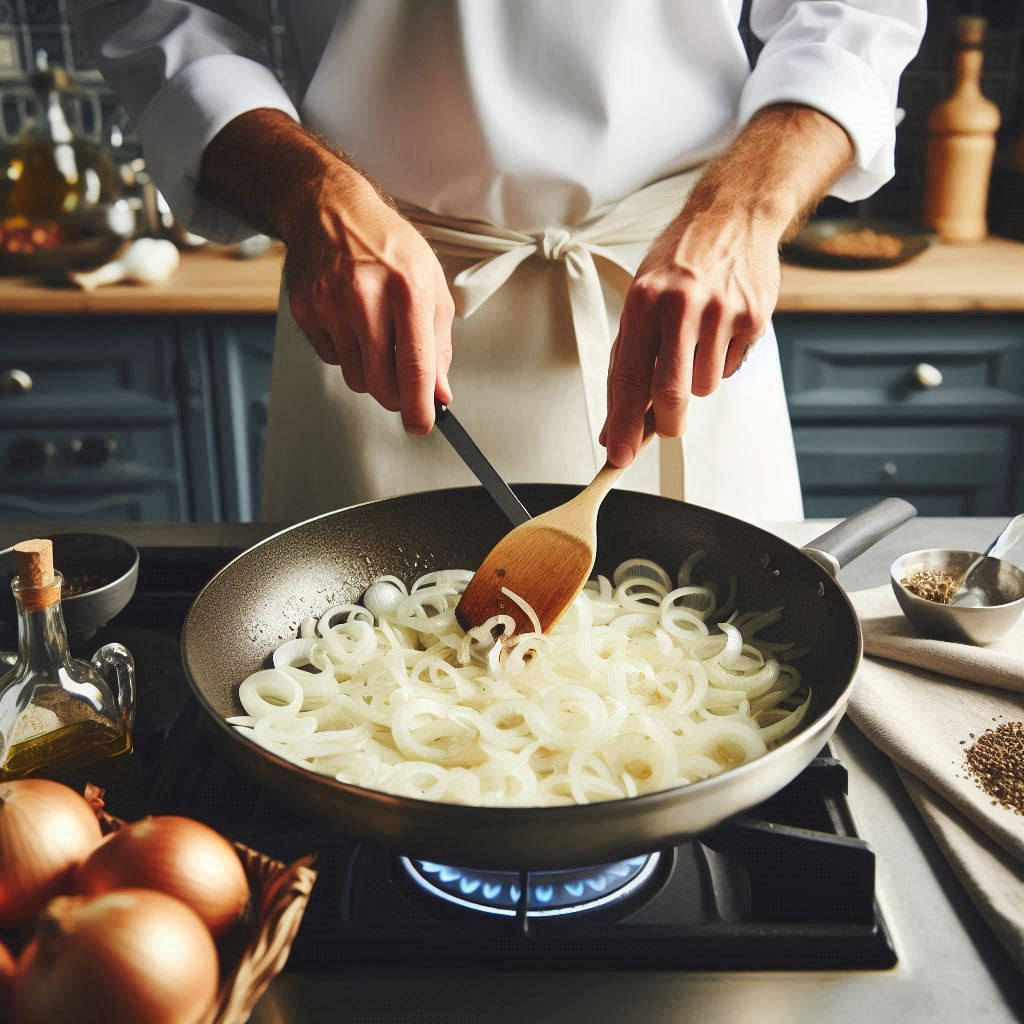How to Caramelize Onions

What’s in this Caramelized Onions Recipe?
This caramelized onions recipe typically includes the following ingredients:
- Onions: Yellow, white, or red onions are commonly used, with yellow onions being the most popular for their sweetness.
- Fat: Olive oil or unsalted butter is used to help cook the onions and enhance their flavor.
- Salt: A pinch of salt helps draw out moisture from the onions and enhances their natural sweetness.
- Optional Add-ins: You can add sugar for extra sweetness, balsamic vinegar for tang, or herbs for added flavor.
Why Caramelize Onions?
Caramelizing onions is a culinary technique that enhances the flavor and texture of this versatile vegetable. Here are some compelling reasons to caramelize onions:
- Enhances Sweetness:
The slow cooking process breaks down the natural sugars in onions, transforming their sharp, pungent flavor into a rich, sweet taste. This sweetness adds depth to dishes, making them more flavorful. - Adds Complexity:
Caramelized onions develop a deep, savory flavor that brings complexity to many recipes. Their umami notes can elevate everything from soups and sauces to meat dishes and side dishes. - Improves Texture:
The slow cooking process softens onions, giving them a tender, melt-in-your-mouth texture. This contrast can enhance the overall mouthfeel of your dishes. - Versatile Ingredient:
Caramelized onions can be used in various dishes, including pastas, pizzas, burgers, sandwiches, and even salads. Their versatility makes them a valuable addition to your culinary repertoire. - Aromatics:
The aroma of caramelized onions cooking is enticing and can elevate the sensory experience of your kitchen. The sweet, savory scent fills the air and can make any meal feel special. - Easy to Prepare:
While it takes time and patience to caramelize onions properly, the process is straightforward. With just a few ingredients and minimal effort, you can create a deliciously complex ingredient. - Make-Ahead Option:
Caramelized onions can be prepared in advance and stored for later use, making meal prep easier. This allows you to have a flavorful addition ready to go when cooking. - Health Benefits:
Onions are rich in antioxidants, vitamins, and minerals. Caramelizing them enhances their nutritional profile, making them a healthy addition to various meals.
In summary, caramelizing onions is a simple yet impactful technique that transforms this humble vegetable into a deliciously sweet and savory ingredient, enhancing the flavors and textures of countless dishes.
What’s the Difference Between Caramelizing and Sautéing?
Caramelizing involves cooking onions slowly over low heat until they become soft, golden brown, and sweet, a process that can take 30 to 60 minutes. In contrast, sautéing is a quicker method that cooks onions over medium-high heat, resulting in a tender but not necessarily sweet onion. Sautéed onions retain more texture and are typically cooked for just a few minutes.
How to Make Ahead and Store the Best Caramelized Onions
To make ahead, cook your onions according to the recipe and let them cool completely. Transfer them to an airtight container and store them in the refrigerator for up to 4 to 5 days. If you want to make a larger batch, caramelized onions can also be stored in the freezer for up to 3 months.
How to Freeze and Reheat Quick Caramelized Onions
To freeze caramelized onions, let them cool completely, then portion them into freezer-safe bags or containers. Squeeze out any excess air to prevent freezer burn. To reheat, you can thaw them in the refrigerator overnight and then heat them in a pan over low heat until warmed through. Alternatively, you can reheat them directly from frozen in a skillet, adding a splash of water or broth to help them warm up without burning.
What to Serve with Easy Caramelized Onions
Caramelized onions are incredibly versatile and can be served with:
- Burgers and Sandwiches: Top your favorite burger or sandwich for a flavor boost.
- Pasta Dishes: Mix into pasta for added depth or use as a pizza topping.
- Soups and Stews: Incorporate them into soups for richness or use in French onion soup.
- Egg Dishes: Add to omelets, frittatas, or quiches for extra flavor.
- Cheese Boards: Serve as part of a cheese platter with crackers and cured meats.
How to Caramelize Onions
- Slice Onions: Start by slicing the onions evenly.
- Heat the Pan: In a large skillet, heat olive oil or butter over medium-low heat.
- Add Onions and Salt: Add the sliced onions and a pinch of salt to the pan. Stir to coat the onions in fat.
- Cook Slowly: Allow the onions to cook slowly, stirring occasionally, for 30 to 60 minutes until they are soft and golden brown. Adjust the heat as necessary to prevent burning.
- Add Optional Ingredients: If desired, add a pinch of sugar or balsamic vinegar for added sweetness or tang during the last few minutes of cooking.
- Enjoy: Remove from heat and use immediately or store for later use.
Caramelized Onions Nutrition Information
Caramelized onions are low in calories but rich in flavor. A typical serving (1/4 cup) of caramelized onions contains approximately:
- Calories: 60-80 calories (depending on the amount of oil or butter used)
- Fat: 5-7 grams (mostly from the oil or butter)
- Carbohydrates: 10-12 grams
- Fiber: 1-2 grams
- Sugars: 3-5 grams (natural sugars from the onions)
- Protein: 1 gram
Keep in mind that nutrition values can vary based on the specific ingredients and quantities used in your recipe.
Conclusion
Caramelizing onions is a simple yet transformative cooking technique that elevates the flavor of a variety of dishes. By patiently cooking onions over low heat, you unlock their natural sweetness and create a rich, golden-brown delicacy that can enhance everything from burgers to pastas. With the right ingredients and methods, you can achieve perfectly caramelized onions every time.
Whether you’re making them ahead for meal prep, freezing for future use, or incorporating them into your favorite recipes, the versatility of caramelized onions makes them a kitchen staple worth mastering. With these tips and techniques, you can enjoy the deliciously sweet and savory flavor of caramelized onions, adding depth and richness to your meals.
So, gather your onions, fire up the stove, and start caramelizing! You’ll be amazed at how this simple ingredient can transform your cooking and impress your family and friends. Happy cooking!
Frequently Asked Questions (FAQs)
Can I caramelize onions in advance?
Yes, you can caramelize onions in advance. They can be cooked, cooled, and stored in an airtight container in the refrigerator for up to 4 to 5 days. This makes meal prep easier, allowing you to add them to your dishes whenever needed.
How long do caramelized onions last?
When stored properly in the refrigerator, caramelized onions will last for about 4 to 5 days. If you want to keep them longer, consider freezing them.
Can I freeze caramelized onions?
Absolutely! Caramelized onions freeze well. After cooking and cooling, portion them into freezer-safe bags or containers, removing as much air as possible to prevent freezer burn. They can be stored in the freezer for up to 3 months. When you’re ready to use them, simply thaw in the refrigerator overnight or reheat directly from frozen in a skillet.
Share this content:

A seasoned chef with over 10 years of experience in New York. I passionately share my journey and healthy, flavorful recipes online.













Post Comment